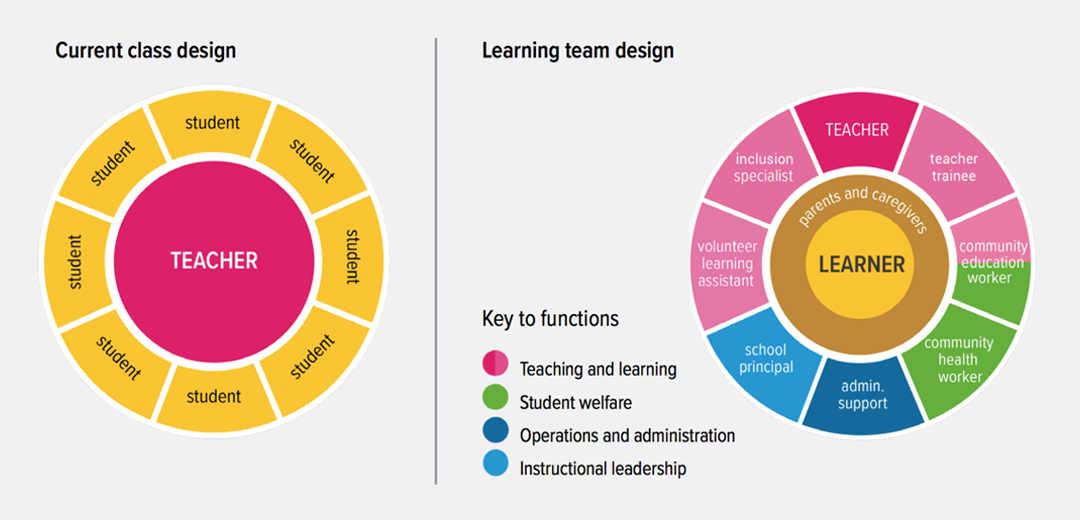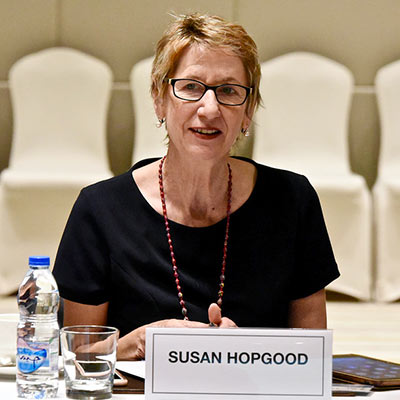Workforce Transformation
An education workforce for the future
Through the Education Workforce Initiative (EWI), the Commission is working with experts, researchers, and country partners worldwide to rethink the education workforce. This new research program is identifying innovative ways teachers, support staff, district leaders, and others can equip students with adaptable skills for the 21st century.
A fresh approach
Drawing on concrete examples of how successful education workforce reform and innovation have been implemented across the globe, EWI is bringing fresh thinking to the education workforce to ensure the right teams and roles at the school and district level – teachers, support personnel, school and district leaders – are in place for inclusive, quality education. EWI’s flagship report, Transforming the Education Workforce: Learning Teams for a Learning Generation, draws on research and evidence to propose new ways to approach workforce design and implementation, including the use of technology.

A global learning crisis
There is a real risk the world will not achieve inclusive, quality education for all by 2030 as set out in SDG 4. To meet the growing demand for quality education, the world must recruit and train 69 million teachers by 2030, 76 percent of them in Sub-Saharan Africa and South Asia. In some of the poorest countries, the required increase in teachers is equal to at least half of the projected number of graduates of tertiary education – a proportion unprecedented in even the most successful and most industrialized nations.
New approaches are needed, but increasing the supply of teachers alone will not be enough. Even in places where there are sufficient teachers in classrooms, many are not qualified or properly trained, and they often have limited pedagogical and subject knowledge. In addition, teachers often work in relative isolation with little support and are expected to fulfill increasingly diverse roles in order to respond to wide-ranging needs of their learners. There has been very little analysis and thought leadership around the changing role of the teacher and additional roles beyond classroom teachers that can support students to learn the skills and knowledge needed to thrive in this century.
The Education Workforce Initiative (EWI) is exploring options to professionalize a wider set of roles in the education workforce at both school and district levels.
Evidence and future thinking on the education workforce
EWI’s flagship report, Transforming the Education Workforce: Learning Teams for a Learning Generation draws on the latest evidence and innovations to propose three dynamic visions for the education workforce, both now and in the future:
- Vision 1: Strengthen the education workforce. This involved creating an effective education workforce at all levels of an education system, with coherent approaches to strengthening each element of the workforce lifecycle for all roles – from recruitment and preparation, to professional development and career progression.
- Vision 2: Build learning teams. Many teachers are not sufficiently supported to develop the skills required to provide inclusive, quality learning for students. Effective teachers are critical, but they cannot work alone – it takes a team to educate a child. Countries need to harness the talent of the broader education workforce.
- Vision 3: Transforming education systems into learning systems. A learning system is a future-oriented vision, where learning teams, networks of education professionals, cross-sectoral partnerships, data, and evidence are harnessed to build a system that is able to learn and adapt.
Working with countries
EWI is working with three countries – Ghana, Sierra Leone, and Vietnam – to address their education workforce challenges, drawing on the research and testing new approaches
- Ghana: Redesigning the education workforce to improve learning. EWI and PricewaterhouseCoopers Ghana are working with the Ministry of Education and Ghana Education Service (GES) to redesign the national, regional, district and school workforce to improve learning, support equitable and inclusive access to education, and enable more effective school management. An organizational design approach is being used to understand existing challenges and define critical roles challenges and their associated competencies and skills.
- Vietnam: Leveraging adaptive and active learning to support STEM. EWI has partnered with the Ministry of Education and Training (MoET) and Arizona State University (ASU) to prototype an adaptive and active learning program for 7th grade math teachers and students. This has drawn on ASU’s work on “High Touch High Tech Learning” which has shown how adaptive and active learning can be used to free up teachers’ time to focus on “high touch” learning of students through projects, discussions, hands-on experiences, nurturing higher order skills such as complex problem-solving and socio-behavioral skills. An independent evaluation showing significant impact on learning outcomes was led by researchers from the Korea Advanced Institute of Science and Technology, Seoul National University, University of Illinois, and Yonsei University.
- Sierra Leone: Rethinking teacher deployment for equity. EWI is working with the Teachers Service Commission and Fab Inc. to explore options for disadvantaged districts to have a sufficient supply of high-quality, qualified teachers, in line with the government’s ambition for a fully competent workforce by 2023. Evidence, analysis, and policy products on a range of issues including effective education workforce management, teacher recruitment and preference matching, and education workforce spatial analysis, have been undertaken to support the development of workforce policy.
Our Innovative Pedagogies Project (IPP) is working with country partners in Ghana, Kenya, and Rwanda to create awareness, political will, and action around adopting inclusive, engaging, adaptive, and playful pedagogies and breadth of skills. This research and advocacy project, supported by The LEGO Foundation, is part of a wider effort to provide an inclusive, engaging, and adaptive education for every child.
We are collaborating with the Institute for Educational Planning and Administration at the University of Cape Coast in Ghana; Aga Khan Foundation and Samuel Hall in Kenya; and A Partner in Education, and The Wellspring Foundation in Rwanda to highlight bright spots and innovative practices within each country and to co-develop country action plans to address the gaps. Learn more about IPP here, read the IPP policy brief, and check out the IPP digital toolkit to help us promote the power of inclusive, adaptive, and engaging ways of teaching .
- The Innovative Pedagogies Project in Ghana: Expectations vs. reality
- Enabling teachers to design and adapt their own learning solutions
- Creating inclusive and playful classrooms through values-based teaching
- Rewiring Education for People and Planet report calls for cross-sectoral collaboration
Leadership for Foundational Learning in Africa: Evidence and Considerations for the Future ›
Read this brief discussing the evidence-based reforms to improve school leadership and learning outcomes in Africa
Innovative Pedagogies Project: Policy brief ›
Read the brief resulting from work in Ghana, Kenya, and Rwanda to create greater action towards adopting inclusive, engaging, adaptive, and playful pedagogies
Inclusive, engaging, and adaptive pedagogies rubric ›
Download this practical diagnostic tool for national stakeholders to assess existing pedagogies in their primary education systems and identify gaps and priorities to strengthen IEA pedagogies moving forward
Joint publication with the Global Partnership for Education ›
Teachers and Beyond: A Mapping of Prominent Education Workforce Tools and Frameworks
Download our latest joint publication with EdDevTrust and IIEP-UNESCO ›
Read about change agents at the middle-tier of education systems
Download the latest brief on leadership ›
Read the second in a series of briefs on Transforming the Education Workforce and COVID-19
Download the latest brief on learning teams ›
Read the first in a series of notes on Transforming the Education Workforce and COVID-19
Transforming the Education Workforce ›
This major report offers new visions for strengthening, diversifying, and reimagining an education workforce that can deliver inclusive, quality education for all.
Background papers for the report
Background papers for the Transforming the Education Workforce report
Re-envisioning and Strengthening the Education Workforce ›
An initial literature review of current research on the education workforce globally
Education Workforce Initiative Overview ›
A two-page explanation of the Education Workforce Initiative
Foundational Learning & the Education Workforce: Global Evidence & Implications for Pakistan › Read the brief on foundational learning and the education workforce in Pakistan produced in partnership with Oxford’s Blavatnik School of Government with support from UK Aid
What Matters Most for Teacher Deployment? A case study of teacher preferences in Sierra Leone ›
School Leaders’ Preferences on School Location in Sierra Leone
Rwanda Learning Partnership report ›
Read about insights on school and system leadership during COVID-19 produced in partnership with the Rwanda Basic Education Board, Education Development Trust, and WISE
Policy guide on bridging the evidence to policy gap ›
Learn more about the learning partnership approach to research
Lebanon Policy Dialogue report ›
Read about innovations in teacher deployment and distribution
Action Areas for the education workforce for marginalized girls ›
Read the evidence overview for an education workforce to support the learning of girls and marginalized students, used to inform a Southeast Asia Policy Dialogue
Sierra Leone research papers ›
Read about innovative analysis for the education workforce
Sierra Leone flipbook ›
Read about EWI’s analysis for the Teaching Service Commission to help improve the supply of qualified teachers in hard-to-reach areas
Ghana country report ›
Read about redesigning the education workforce in Ghana
Sierra Leone country report ›
Read about innovative education workforce analysis for more equitable education in Sierra Leone
Vietnam country report ›
Read about the High Touch High Tech prototype in Vietnam

